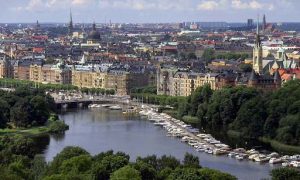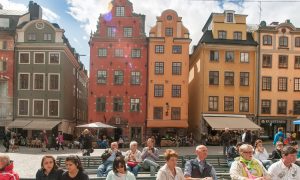Sweden, as the most popular NordicimmigrantsOne of the countries that attracts immigrants from all over the world with its high welfare, high income and quality living environment. However, if you want to live and develop in Sweden for a long time, you must understand the local cost of living, tax policies and welfare system. This article will provide you with a detailed analysis ofImmigration to Swedenthe actual cost of the program and help you plan your budget.
One,Immigration to SwedenMain costs
Immigration to SwedenThe costs vary according to individual circumstances and are mainly related toVisa application fees, housing, daily expenses, health insurance and taxesetc.
1. Visa and residence application fees
Fees for different types of visas and residence permits vary, here are some common immigration categories and their application fees (up-to-date as of 2025):
| Type of immigration | Application fee (SEK/SEK) | Application Time |
|---|---|---|
| work visa | 2,200 SEK | 3-6 months |
| skilled migrant(EU Blue Card) | 2,200 SEK | 2-4 months |
| investment immigration | 2,200 SEK | 6-12 months |
| family reunification | 2,000 SEK | 6-12 months |
| Permanent Residence (PR) | 1,500 SEK | 6-12 months |
| Naturalization application | 1,500 SEK | 12-24 months |
Note: Some applications may involve additional fees for notarization, translation and certification of materials.
2. Housing costs: renting vs. buying
Housing is one of the biggest expenses after immigrating to Sweden, especially in big cities such as Stockholm and Gothenburg, where prices and rents are high.
-
Rental costs(Monthly rent):
- Stockholm city center:12,000 - 18,000 SEK(one bedroom)
- Gothenburg, Malmö:9,000 - 14,000 SEK(one bedroom)
- Smaller cities or suburbs:6,000 - 9,000 SEK(one bedroom)
-
Cost of Buying a House::
- Stockholm downtown apartment:70,000 - 110,000 SEK/square meter
- Gothenburg, Malmö:50,000 - 80,000 SEK/square meter
- Smaller cities and suburbs:30,000 - 50,000 SEK/m2
In the early stages of immigration, most people will choose to rent, but in the long run, buying a property can save you the cost of rent and enjoy the benefits of property appreciation.
II. Cost of daily living in Sweden
In addition to housing, daily living expenses are also a key point to consider. Below are the average monthly costs of living (for a single person) in Sweden's major cities:
| living expenses | Cost (SEK) |
|---|---|
| utility bills | 800 – 1,500 |
| Transportation (monthly subway/bus pass) | 970 – 1,200 |
| board expenses | 3,500 – 6,000 |
| cell phone package | 200 – 400 |
| Recreation (gym, movies, social events) | 1,500 – 3,000 |
| total | 8,970 - 12,100 SEK |
For families, the costs increase accordingly, especially when it comes to children's education and health insurance.
III. The Swedish tax system: high tax burden vs. high benefits
The Swedish tax system is based onHigh taxes, high benefitsIt is known that immigrants are required to pay personal income tax, value added tax (VAT) and social security tax.
1. Income Tax
Sweden is practicingprogressive tax rateThe higher the income, the higher the tax rate:
| Annual income (SEK) | income tax rate |
|---|---|
| 0 – 598,500 | 32% (local taxes) |
| 598,501 Above | 52% (local + state taxes) |
Note: Employers are also required to withhold and pay social security taxes (approximately 31%).
2. Value added tax (VAT)
The standard rate of excise tax (VAT) in Sweden is 25%, but some goods and services enjoy a lower tax rate of **6% (e.g., books, public transportation) or 12% (e.g., food, restaurants)**.

3. Social Security Tax (SST)
of the employee's monthly salary 31.42% Contributions are made by the employer for the Social Welfare Fund.
Although taxes are high, Sweden offers one of the best social welfare systems in the world.
Four,Immigration to SwedenBenefits Analysis
Despite the heavy tax burden, Sweden has attractive social benefits, includingHealth care, free education, childcare subsidies and pensionsetc.
1. Medical care
✅ Sweden has universal healthcare coverage and healthcare is subsidized by the state.
✅ Inexpensive visits, general outpatient costs100 - 300 SEKHospitalization fee per day100 SEKThe
✅ There is an annual cap on the cost of medicines (about SEK 2,500), over which the Government subsidizes.
2. Educational resources
✅ Pre-school education subsidies: Extremely low kindergarten fees, up to a maximum per month 1,500 SEKLow-income families are entitled tofully exemptThe
✅ Compulsory education is free: Elementary through high school are public schools that offerFree lunch, textbooks, school busesetc.
✅ University fees: Swedish citizens and EU studentsfree (of charge)Non-EU students are required to pay a tuition fee (approx.80,000 - 140,000 SEK/year).

3. Family benefits
✅ Child benefit: Each child receives a monthly 1,250 SEKAdditional allowances are paid to families with many children.
✅ parental leave: Parents sharing 480 days Paid parental leave, of which 90 days are to be used by the father.
4. Retirement pensions
✅ State Pension byIndividual contributions + government subsidiesComposition, general retirement age 65-67 yearsThe
✅ The amount of the pension depends on the number of years of work and the level of salary, the average monthly pension is about 16,000 - 25,000 SEKThe
V. Summarizing: Is it worthwhile to migrate to Sweden?
| dominance | challenge |
|---|---|
| ✅ High social welfare with excellent medical, education and childcare benefits | ❌ High taxes, highest personal income tax 52% |
| ✅ High number of job opportunities and strong demand for skilled personnel | ❌ Higher cost of living and expensive house prices |
| ✅ High quality of life and pleasant environment | ❌ Language threshold, Swedish important for career development |
| ✅ EU countries, Schengen freedom to travel | ❌ Long cultural acclimatization period and short winter daylight hours |
Sweden's high quality of life and excellent social benefits make it one of the most livable countries in the world. If you can adapt to high taxes and prices and are willing to integrate into the local community, Sweden is certainly a country worth emigrating to!






